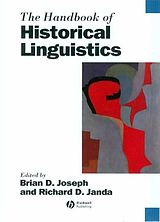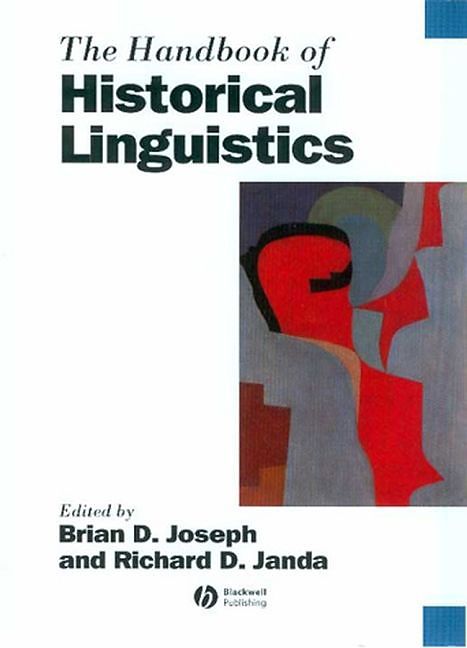The Handbook of Historical Linguistics
Einband:
Fester Einband
EAN:
9780631195719
Untertitel:
Englisch
Genre:
Sprach- und Literaturwissenschaften
Autor:
Brian (Ohio State University) Janda, Richa Joseph
Herausgeber:
John Wiley and Sons Ltd
Auflage:
2nd ed.
Anzahl Seiten:
912
Erscheinungsdatum:
19.12.2002
ISBN:
978-0-631-19571-9
The Handbook of Historical Linguistics provides a detailed account of the numerous issues, methods, and results that characterize current work in historical linguistics, the area of linguistics most directly concerned with language change as well as past language states.
Informationen zum Autor Brian D. Joseph is Professor of Linguistics and Kenneth E. Naylor Professor of South Slavic Linguistics at The Ohio State University. Within historical linguistics, his research focuses mainly on Indo-European languages. He has written and edited numerous books - including Language History, Language Change, and Language Relationship (with Hans H. Hock, 1996) and The Synchrony and Diachrony of the Balkan Infinitive (1983) - and has published over 160 articles. He became editor of the journal Language in 2002. Richard D. Janda is Senior Lecturer and Coordinator for Undergraduate Education in the Department of Linguistics at The Ohio State University. A specialist in both Germanic and Romance linguistics, he has written widely not only on diachronic but also on synchronic issues in phonology, morphology, and morphosyntax, as well as on historical linguistics in general. His more than 70 publications focus on drawing broader implications from the application of theory to specific problems of structure, function, variation, and change in individual languages. Klappentext The Handbook of Historical Linguistics provides a detailed account of the numerous issues, methods, and results that characterize current work in historical linguistics, the area of linguistics most directly concerned with language change as well as past language states. In its introduction and 25 chapters, written by leading specialists in the field, this volume achieves two main goals. It covers the most important methods of historical linguistics including comparative reconstruction and internal reconstruction, reliable ways of determining language relatedness, and contemporary approaches to dialectological investigation. It also presents sophisticated overviews of the principles that emerge from the in-depth study of phonological, morphological, syntactic, and semantic change, including grammaticalization, and offers wide-ranging explorations of the major factors at work in the causation of change. The book begins with an extensive and uniquely comprehensive introduction by the editors that places the study of historical linguistics in its proper context both within the field of linguistics itself and within the historical sciences more generally. The well-conceived and lucidly written articles in this volume, supplemented with an extensive bibliography and detailed indexes, make The Handbook of Historical Linguistics an indispensable resource for anyone with an interest in history and/or language. Zusammenfassung * Provides a comprehensive and current account of the numerous issues! methods! and results that characterize historical linguistics. * Contains an extensive introduction that places the study of historical linguistics in its proper context within linguistics and the historical sciences in general. Part I: Introduction: On Language, Change, and Language Change - Or, Of History, Linguistics, and Historical Linguistics: Richard D. Janda & Brian D. Joseph, both The Ohio State University.Part II: Methods for Studying Language Change: 1. The Comparative Method: Robert L. Rankin, University of Kansas2. On the Limits of the Comparative Method: S.P. Harrison, University of Western Australia.3. Internal Reconstruction: Don Ringe, University of Pennsylvania.4. How to Show Languages are Related: Methods for Distant Genetic Relationship: Lyle Campbell, University of Canterbury, New Zealand.5. Diversity and Stability in Language: Johanna Nichols, University of California, Berkeley.Part III: Phonological Change: 6. The Phonological Basis of Sound Change: Paul Kiparsky, Stanford University.7. Neogrammarian Sound Change: Mark Hale, Concordia University.8. Variationist Approaches to Phonological Change: Gregory R. Guy, York University9. "Phonologization" as the Start of Dephoneticiza...
Autorentext
Brian D. Joseph is Professor of Linguistics and Kenneth E. Naylor Professor of South Slavic Linguistics at The Ohio State University. Within historical linguistics, his research focuses mainly on Indo-European languages. He has written and edited numerous books - including Language History, Language Change, and Language Relationship (with Hans H. Hock, 1996) and The Synchrony and Diachrony of the Balkan Infinitive (1983) - and has published over 160 articles. He became editor of the journal Language in 2002.
Richard D. Janda is Senior Lecturer and Coordinator for Undergraduate Education in the Department of Linguistics at The Ohio State University. A specialist in both Germanic and Romance linguistics, he has written widely not only on diachronic but also on synchronic issues in phonology, morphology, and morphosyntax, as well as on historical linguistics in general. His more than 70 publications focus on drawing broader implications from the application of theory to specific problems of structure, function, variation, and change in individual languages.
Klappentext
The Handbook of Historical Linguistics provides a detailed account of the numerous issues, methods, and results that characterize current work in historical linguistics, the area of linguistics most directly concerned with language change as well as past language states.
In its introduction and 25 chapters, written by leading specialists in the field, this volume achieves two main goals. It covers the most important methods of historical linguistics including comparative reconstruction and internal reconstruction, reliable ways of determining language relatedness, and contemporary approaches to dialectological investigation. It also presents sophisticated overviews of the principles that emerge from the in-depth study of phonological, morphological, syntactic, and semantic change, including grammaticalization, and offers wide-ranging explorations of the major factors at work in the causation of change.
The book begins with an extensive and uniquely comprehensive introduction by the editors that places the study of historical linguistics in its proper context both within the field of linguistics itself and within the historical sciences more generally. The well-conceived and lucidly written articles in this volume, supplemented with an extensive bibliography and detailed indexes, make The Handbook of Historical Linguistics an indispensable resource for anyone with an interest in history and/or language.
Zusammenfassung
* Provides a comprehensive and current account of the numerous issues, methods, and results that characterize historical linguistics. * Contains an extensive introduction that places the study of historical linguistics in its proper context within linguistics and the historical sciences in general.
Inhalt
Part I: Introduction: On Language, Change, and Language Change - Or, Of History, Linguistics, and Historical Linguistics: Richard D. Janda & Brian D. Joseph, both The Ohio State University.Part II: Methods for Studying Language Change: 1. The Comparative Method: Robert L. Rankin, University of Kansas2. On the Limits of the Comparative Method: S.P. Harrison, University of Western Australia.3. Internal Reconstruction: Don Ringe, University of Pennsylvania.4. How to Show Languages are Related: Methods for Distant Genetic Relationship: Lyle Campbell, University of Canterbury, New Zealand.5. Diversity and Stability in Language: Johanna Nichols, University of California, Berkeley.Part III: Phonological Change: 6. The Phonological Basis of Sound Change: Paul Kiparsky, Stanford University.7. Neogrammarian Sound …

Leider konnten wir für diesen Artikel keine Preise ermitteln ...
billigbuch.ch sucht jetzt für Sie die besten Angebote ...
Die aktuellen Verkaufspreise von 6 Onlineshops werden in Realtime abgefragt.
Sie können das gewünschte Produkt anschliessend direkt beim Anbieter Ihrer Wahl bestellen.
Loading...
Die aktuellen Verkaufspreise von 6 Onlineshops werden in Realtime abgefragt.
Sie können das gewünschte Produkt anschliessend direkt beim Anbieter Ihrer Wahl bestellen.
| # | Onlineshop | Preis CHF | Versand CHF | Total CHF | ||
|---|---|---|---|---|---|---|
| 1 | Seller | 0.00 | 0.00 | 0.00 |
